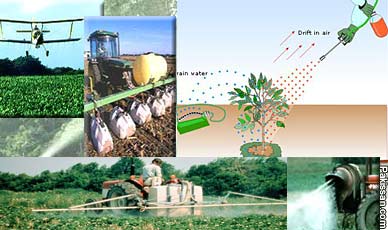|
Trade in sub-standard
pesticides
By Ahmad Fraz Khan
 THE
pesticides trade has come under increasing pressure from the
Punjab government during the last fortnight. In a bid to
control fake and sub-standard pesticides, a Task Force has
started raiding almost every corner of the province to
“ensure quality pesticides in the market.” The pesticides’
manufacturers and formulators responded by accusing the
government of harassment and decided to go on strike and
stop supplying pesticides. THE
pesticides trade has come under increasing pressure from the
Punjab government during the last fortnight. In a bid to
control fake and sub-standard pesticides, a Task Force has
started raiding almost every corner of the province to
“ensure quality pesticides in the market.” The pesticides’
manufacturers and formulators responded by accusing the
government of harassment and decided to go on strike and
stop supplying pesticides.
The government’s campaign started in July, which is one of
the three crucial months with August and September for
application of pesticides both for cotton and rice.
Farmers panicked as supplies got squeezed and traders and
government refused to relent from their stated positions.
The government wants to purge the market of fake and
sub-standard pesticides, and traders complain that in their
enthusiasm to cleanse the market, officials forget that the
right regulatory regime has not been put in place to get
positive outcome.
Ultimately, the manufacturers and formulators relented on
July 8, but only for 10 days, threatening to go on an
indefinite strike if official campaign was not stopped and
their other demands were not accepted. The Punjab government
welcomed the end of the strike but it refused to “go slow on
raids and be blackmailed into leaving the trade with sellers
of sub-standard pesticides.”
As both sides locked their horns, no one from the government
side tried to look into the causes of the current
dispensation governing pesticide trade. The sector falls
under the purview of the Ministry of Food, Agriculture and
Livestock (MINFAL) – rather than the provincial government.
The Punjab government, with a perceptibly strong
administrator taking over as the chief minister, resorted to
administering pesticides market rather than wasting time on
policy matters, which, anyway, fall outside its
jurisdiction.
The federal government has recently exempted imports of
pesticides from all taxes and duties. The manufacturers
complain that importers of raw material of pesticides have
to pay 16 per cent general sales tax (GST) and five per cent
import duty. Thus importers of pesticides (traders) now have
an advantage of 21 per cent on manufacturers, they added.
The manufacturers say that they are handicapped by the
absence of any manufacturing policy – an essential
first-step to bring any investment and encourage local
production of pesticides --- which would make it much easier
to control quality.
Controlling quality of imported pesticides needs a very
stringent and efficient regulatory import regime. Pakistan,
unfortunately, also suffer on this account.
Till recently, the import of pesticide was taxed and huge
quantities were smuggled into the country. The smuggled
items were not subject exposed to any quality check. The
issue came to fore in the current campaign against
sub-standard pesticides when documents for huge quantities
were found missing and a huge number of FIRs were lodged
against the defaulters.
No body really knows how to ensure and sustain quality of
these smuggled pesticides. It ends in a vicious cycle of
blame game; the retailers accusing the dealers, who in turn
hold importers responsible and importers pass the buck to
the foreign manufacturers.
There is no permanent body, like in the pharmaceutical
trade, to fix the responsibility at what stage a pesticide
became sub-standard. Whether it was a manufacturing fault or
mishandling at the transportation or storage stage caused
it. Thus the retailers, the end-seller, bore the brunt for
others’ fault and cried foul, forcing other stakeholder to
go on strike.
As a first step, the government should reverse the policy of
encouraging trade and come up with a national pesticides
manufacturing policy. It should at least encourage if it
cannot make manufacturing compulsory within the country.
Only then it would be able to control quality to the
pesticides with any measure of success.
Only local manufacturing will give the government some kind
of control over the price of pesticides. Presently, the
traders tend to make windfall profits because no one knows
at what price they import and what price they should charge.
The pesticides prices went up by 25 to 30 per cent last year
alone.
Since most of the trade is in the hand of traders, they
cannot be forced into extension services which are essential
for the success of agriculture sector. To promote their
brand the local manufacturing companies could offer
extension services to farmers on the right time and doses
and pest identification. With the government extension
services being almost non-existent, the farmers are also on
their own in dealing with pests. And with substandard and
fake pesticides invading trade, one can imagine what an
unaware and illiterate farmer can do.
Courtesy:
The DAWN
|
Pakissan.com;
|